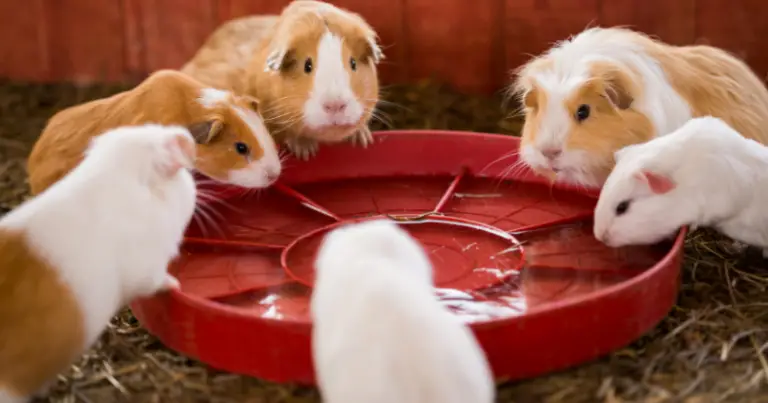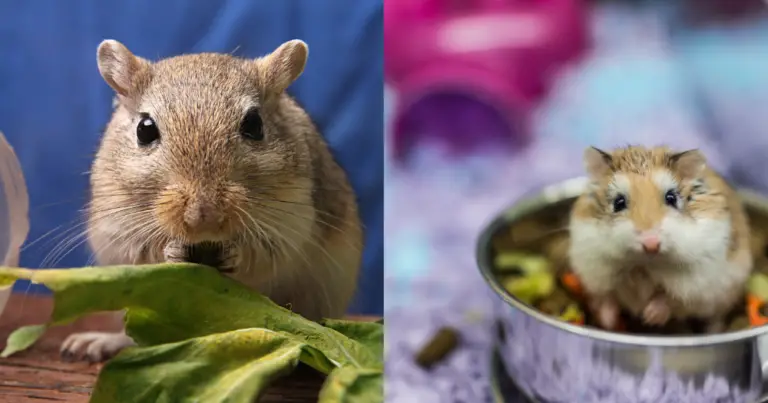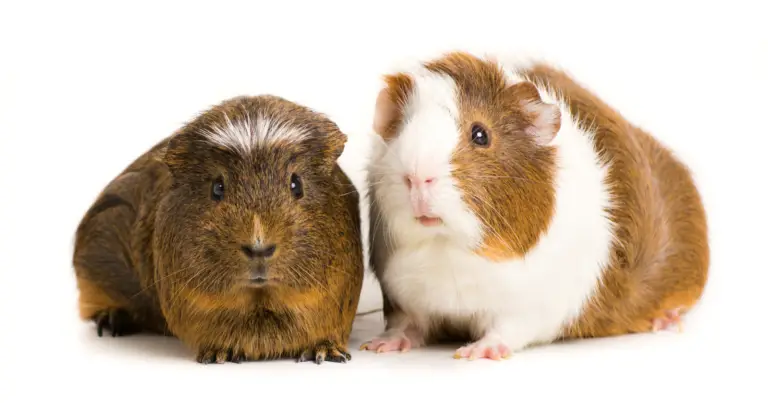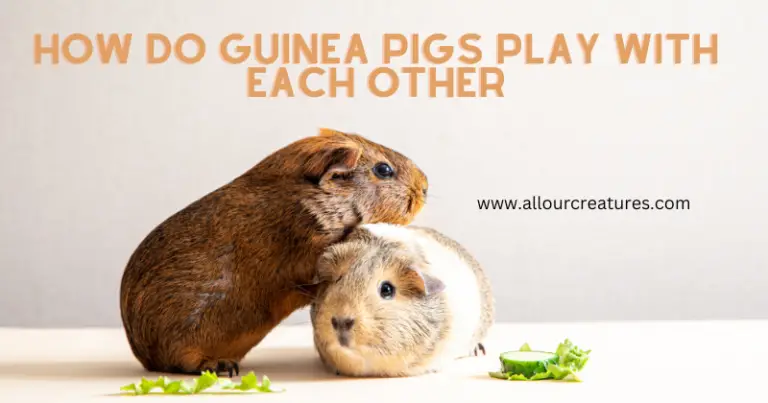Why Is My Guinea Pig Not Eating Hay: Quick Answers and Solutions
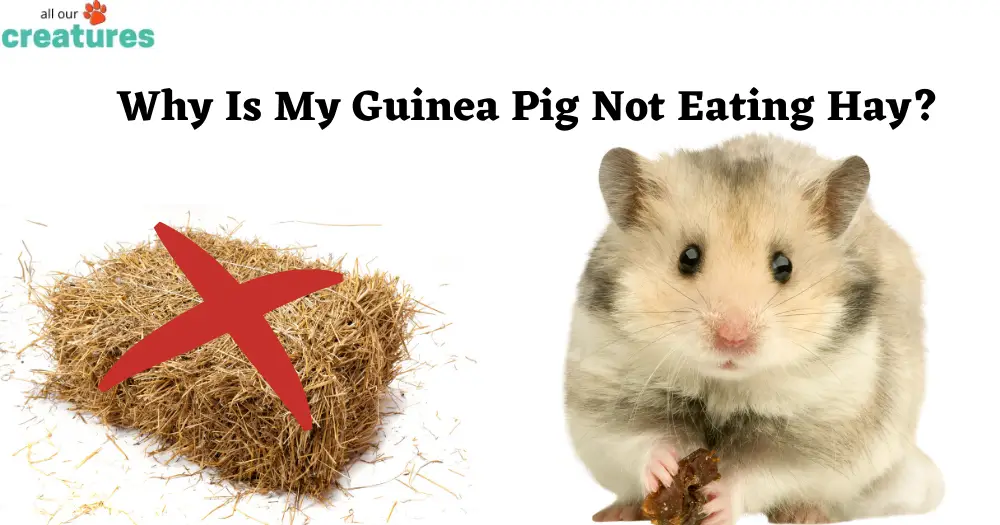
Guinea pigs are popular pets known for their friendly nature and adorable appearance. However, as owners, we may come across situations where our furry friends don’t seem to be eating one of the most important components of their diet. Most owners may ask, “Why Is My Guinea Pig Not Eating Hay”? This can be concerning as hay provides essential fiber for their digestive system and helps maintain healthy teeth.
There could be several reasons why your guinea pig is not eating hay, ranging from dental issues to boredom or a preference for other foods. Understanding the possible causes and taking the necessary steps to encourage hay consumption can ensure your guinea pig maintains a balanced diet for a healthy, happy life.
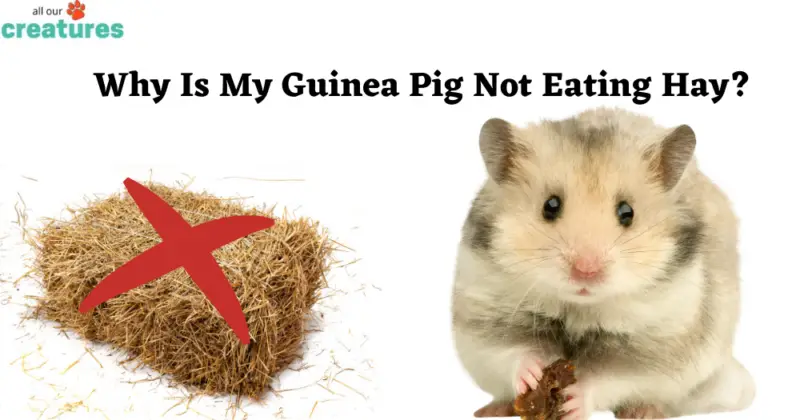
Contents
Table of Contents
The Importance of Hay in a Guinea Pig’s Diet
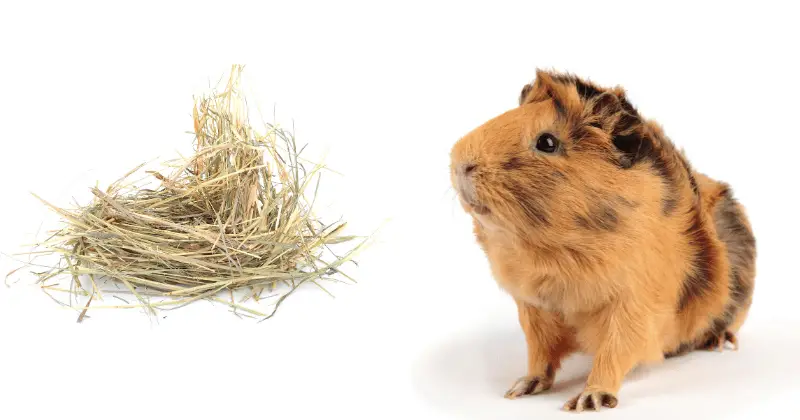
Guinea pigs are herbivores, and hay is crucial to their overall health and well-being. Hay is important for guinea pigs for several reasons, including its nutritional value, digestive health benefits, and contribution to maintaining good dental health.
Nutritional Value
Hay, especially timothy hay, is an essential part of a guinea pig’s diet, providing them with the right balance of nutrients. It’s rich in fiber, which is vital for their digestion, and low in calories, helping to maintain a healthy weight. Moreover, it contains important vitamins and minerals, such as vitamin C, an essential nutrient for guinea pigs as they can’t synthesize it independently.
Some key nutritional components of hay include:
- High fiber content
- Low-calorie count
- Vitamins and minerals, including vitamin C
Digestive Health
A guinea pig’s digestive system relies on a constant supply of hay to function properly. The high fiber content in hay aids digestion by promoting healthy gut movement, which in turn prevents gastrointestinal issues common in guinea pigs, such as bloat and constipation. Furthermore, guinea pigs need continuous access to hay to keep their digestive system working smoothly.
Dental Health
Guinea pig teeth grow continuously, and it’s important they have something to chew on to wear them down and prevent overgrowth. Hay helps grind down their teeth and maintain their dental health. Chewing on hay also offers guinea pigs a source of entertainment, keeping them occupied and preventing boredom in their cages.
Hay is a vital component of a guinea pig’s diet due to its nutritional value, digestive health benefits, and dental health maintenance. Ensuring your guinea pig has access to fresh hay daily is crucial for their overall health and happiness.
Reasons Why a Guinea Pig May Not Eat Hay
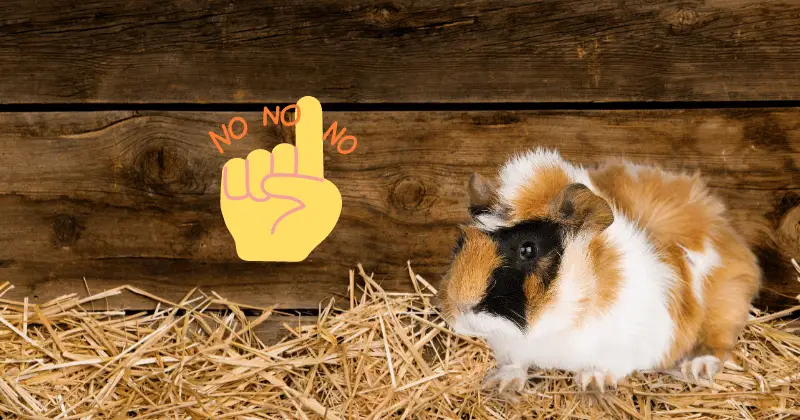
Health Problems
A variety of health issues could cause your guinea pig to stop eating hay. Digestive problems, constipation, and illness may affect their appetite, leading them to avoid hay.
One specific health issue to watch for is a weakened immune system, as this can cause a decline in your guinea pig’s overall health, including their ability to eat hay. Sneezing may be a sign of potential allergies, which may also affect their appetite.
If you notice any concerning symptoms or changes in your guinea pig’s behavior, consult with a veterinarian immediately. Early diagnosis can help address health problems and improve your cavy’s well-being.
Dental Issues
Guinea pigs may also stop eating hay due to dental issues, such as overgrown teeth. Over time, guinea pig teeth continuously grow, and eating hay helps to wear them down. If your guinea pig is struggling to eat hay, it may be due to their teeth causing them pain. In such cases, your guinea pig may need treatment such as teeth trimming to alleviate their discomfort.
Dental problems could be a severe concern and may require professional care. Consult your veterinarian if you suspect dental issues are affecting your guinea pig’s ability to eat hay. Surgery may be necessary in severe cases.
Environmental Factors
Lastly, environmental factors could directly impact your guinea pig’s appetite for hay. A dirty cage or unsanitary conditions can cause your cavy discomfort and discourage them from eating. Ensure you keep their environment clean and change the substrate regularly.
Another consideration is the quality of the hay provided to your guinea pig. Picky eaters might avoid hay if it doesn’t meet their standards. Try offering a different type of hay or mixing in fresh leafy vegetables to encourage hay consumption.
Remember, your guinea pig’s well-being relies on proper care and understanding their needs. If they stop eating hay, consider these factors and consult a veterinarian for advice and possible treatment if necessary.
“My Guinea Pig Hates Hay” – Try This!
How to Encourage Guinea Pigs to Eat More Hay
Choose High-Quality Hay
Ensure that you provide your guinea pigs with high-quality hay with good taste. Choose colorful and fragrant hay, such as timothy hay or meadow hay. The hay should be green and not beige, as freshness directly impacts the taste and overall quality of the hay.
Consider offering different cuts of hay, like the second or third cut. These tend to be softer and more appealing to guinea pigs. While grass hay should be the primary source of hay, mixing in small amounts of protein-rich hays, like Lucerne or clover, can help encourage your guinea pig to munch on more hay.
Introduce New Hay Varieties
Encourage your guinea pig to eat more hay by introducing a variety of hay types. You can try different cuts of hay or even try hand-feeding them to establish a better bond. Occasionally mix in fresh greens or vegetables to create a tasty tossed salad. This will help pique their interest and encourage them to explore different tastes.
Keep in mind that guinea pigs are sensitive to changes in weather and may prefer crunchy hay during colder months and softer hay during warmer months. Rotate the types of hay you provide accordingly, ensuring that they maintain a balanced diet.
Create a More Appealing Feeding Environment
The cage environment plays a crucial role in a guinea pig’s appetite for hay. Ensure that the cage is clean, and the substrate is changed regularly, creating a comfortable environment for your pet.
- Prioritize proper hay storage to maintain freshness and prevent spoilage.
- Place hay within easy reach by utilizing a hay rack or other feeding accessories.
- Spread fresh hay in different areas of the cage to encourage foraging and distribute it evenly.
By focusing on providing quality hay, introducing new hay varieties, and creating an appealing feeding environment, you can encourage your guinea pigs to eat more hay and maintain a healthy diet.
Understanding Your Guinea Pig’s Preferences and Needs
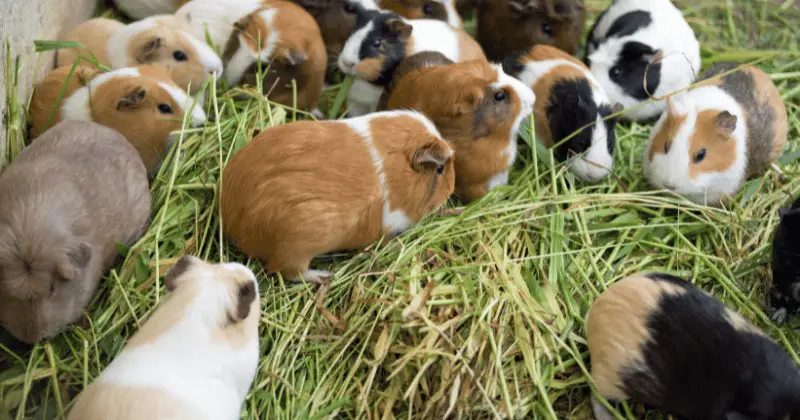
Dealing with Picky Eaters
Guinea pigs can be quite the picky eaters when it comes to their hay, and their preferences may depend on factors such as taste, smell, or even the stalks and texture of the hay. Sometimes, a guinea pig might not eat hay simply because they are picky or have sensitive palates.
Trying a different brand, type, or cut of hay can help in this situation. It’s important to cater to these preferences, as hay is crucial for their digestive system and provides essential nutrients.
Hay also helps in maintaining healthy teeth, as guinea pigs have teeth that continuously grow. Some guinea pigs might prefer a specific type of grass hay, such as timothy or orchard grass, while others might like a mix.
If you have other pets like rabbits or chinchillas, swapping the hay with their hay can be an option worth exploring. Additionally, consider the following when dealing with picky eaters:
- Stressed guinea pigs: Stress can cause a decrease in appetite. Make sure your guinea pig is comfortable and not feeling threatened.
- Adequate nutrition: Offer fresh veggies rich in vitamins and minerals to balance their diet. Do not offer too many treats, as they can lower the interest in hay.
- Regular replacement: Replace old or moldy hay with fresh hay to keep it appealing to your guinea pig.
Adjusting Your Feeding Routine
Adjusting your guinea pig’s feeding routine can also help in improving hay consumption. Here are some tips to consider:
- Offer fresh hay daily: Make sure the hay is not moldy or damp, as it can cause respiratory infections.
- Limit pellets: By limiting their pellet intake, you’ll encourage your guinea pig to eat more hay, but make sure to provide guinea pig-safe vitamin C supplements.
- Hand-feed hay: Spend some time hand-feeding hay to your guinea pig. This can help create a bond between you and your pet, encouraging them to eat hay.
- Switch up the taste: Offer different types of hay to keep them interested and prevent boredom.
- Monitor closely: Observe your guinea pig’s eating habits and ensure they are eating their daily hay requirement. If your guinea pig is still not eating hay, it might be due to a medical condition, allergy, or dental issue. Consult a veterinarian for guidance.
Remember, it is vital for guinea pigs to have enough hay as part of their diet. Addressing picky eating behaviors, staying aware of their preferences, and adjusting feeding routines can significantly improve your guinea pig’s hay consumption habits, ensuring a happy and healthy furry friend.
FAQs: Why Is My Guinea Pig Not Eating Hay

Why is my guinea pig not eating hay?
There can be several reasons why a guinea pig may not be eating hay. It could be due to dental issues, digestive problems, preference for other foods, or even stress. Observing their behavior and consulting a veterinarian can help determine the underlying cause.
What should I do if my guinea pig refuses to eat hay?
If your guinea pig is not eating hay, try offering different types of hay, such as Timothy, orchard grass, or meadow hay to see if they show a preference. You can also try offering hay in different forms, like hay cubes or hay pellets, to entice them to eat.
Are there any health concerns if my guinea pig doesn’t eat enough hay?
Yes, if a guinea pig doesn’t eat enough hay, it can lead to dental problems, digestive issues, and an imbalance in their diet. Hay is important for their dental wear, digestive health, and overall well-being.
What are some tips to encourage my guinea pig to eat hay?
To encourage your guinea pig to eat hay, ensure that fresh, good-quality hay is always available in their habitat. Place hay racks or hay balls in accessible locations. You can also try offering a mix of fresh herbs or sprinkle a small amount of vegetable pellets over the hay to make it more enticing.
When should I be concerned about my guinea pig not eating hay?
If your guinea pig completely refuses to eat hay for more than a day or shows other signs of illness, such as weight loss, lethargy, or changes in behavior, it is important to consult a veterinarian promptly. They can help identify any underlying health issues and provide appropriate treatment.



